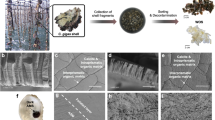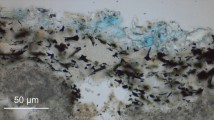Abstract
IN previous communications1, I have described investigations of the chief blue pigment extracted by acids from the shell of the gastropod Haliotis cracherodii Leach. Important evidence has been produced by Tixier and Lederer2 against our view, based largely on spectroscopic findings, that this pigment is an indigoid. A joint study of the blue pigment, in collaboration with these workers, is in progress. In the meantime, we have obtained one of the accompanying yellow pigments in sufficient yield to perform spectrographic studies upon it, and upon its zinc complex.
This is a preview of subscription content, access via your institution
Access options
Subscribe to this journal
Receive 51 print issues and online access
$199.00 per year
only $3.90 per issue
Buy this article
- Purchase on Springer Link
- Instant access to full article PDF
Prices may be subject to local taxes which are calculated during checkout
Similar content being viewed by others
References
Comfort, A., Nature, 162, 851 (1948); Biochem. J., 45, 204 (1949).
Tixier, R., and Lederer, E., C.R. Acad. Sci., Paris, 228, 1669 (1949).
Author information
Authors and Affiliations
Rights and permissions
About this article
Cite this article
COMFORT, A. A Subsidiary Shell Pigment of Haliotis cracherodii Leach. Nature 166, 194–195 (1950). https://doi.org/10.1038/166194b0
Issue Date:
DOI: https://doi.org/10.1038/166194b0
Comments
By submitting a comment you agree to abide by our Terms and Community Guidelines. If you find something abusive or that does not comply with our terms or guidelines please flag it as inappropriate.



